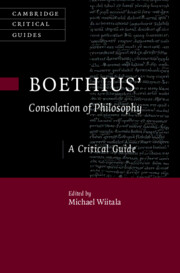Book contents
- Boethius’ Consolation of Philosophy
- Cambridge Critical Guides
- Boethius’ Consolation of Philosophy
- Copyright page
- Contents
- Contributors
- Abbreviations of Boethius’ Works
- Introduction
- Chapter 1 Boethius’ Philosophiae consolatio
- Chapter 2 The Ascent from Π to θ, or On Philosophy’s Teaching a Blind Man to See
- Chapter 3 Lady Philosophy as a Feminine Personification of Wisdom
- Chapter 4 Boethius’ Christianity in the Consolatio
- Chapter 5 The Blending of Pagan and Christian Elements in Book III of the Consolatio
- Chapter 6 The Human Person in the Consolation of Philosophy
- Chapter 7 Self-Investigation, Self-Knowledge, and Inner Conflict in Boethius’ Consolation of Philosophy
- Chapter 8 What It Means to Be a God
- Chapter 9 A Consolation through Philosophical Insight?
- Chapter 10 Being and Existence in the Consolation of Philosophy
- Chapter 11 Circle and Sphere Metaphors for God’s Nature and Providence in Boethius’ Consolation of Philosophy and Dionysius’ On Divine Names
- Chapter 12 Time and Eternity in the Consolation of Philosophy
- Chapter 13 Boethius on Human Freedom and Divine Foreknowledge
- References
- Index
- Cambridge Critical Guides
Chapter 13 - Boethius on Human Freedom and Divine Foreknowledge
Published online by Cambridge University Press: 23 May 2024
- Boethius’ Consolation of Philosophy
- Cambridge Critical Guides
- Boethius’ Consolation of Philosophy
- Copyright page
- Contents
- Contributors
- Abbreviations of Boethius’ Works
- Introduction
- Chapter 1 Boethius’ Philosophiae consolatio
- Chapter 2 The Ascent from Π to θ, or On Philosophy’s Teaching a Blind Man to See
- Chapter 3 Lady Philosophy as a Feminine Personification of Wisdom
- Chapter 4 Boethius’ Christianity in the Consolatio
- Chapter 5 The Blending of Pagan and Christian Elements in Book III of the Consolatio
- Chapter 6 The Human Person in the Consolation of Philosophy
- Chapter 7 Self-Investigation, Self-Knowledge, and Inner Conflict in Boethius’ Consolation of Philosophy
- Chapter 8 What It Means to Be a God
- Chapter 9 A Consolation through Philosophical Insight?
- Chapter 10 Being and Existence in the Consolation of Philosophy
- Chapter 11 Circle and Sphere Metaphors for God’s Nature and Providence in Boethius’ Consolation of Philosophy and Dionysius’ On Divine Names
- Chapter 12 Time and Eternity in the Consolation of Philosophy
- Chapter 13 Boethius on Human Freedom and Divine Foreknowledge
- References
- Index
- Cambridge Critical Guides
Summary
Boethius’ initial question in the Consolation of Philosophy is why God, who orders the natural universe beautifully, would allow human affairs to proceed in a chaotic fashion, even permitting the wicked to trample on the virtuous and go unpunished. Lady Philosophy responds that God governs everything well. What seem to limited human beings to be misfortunes can all be turned to good. This introduces the importance of human free will and a perennial question for Christian philosophers: If God foreknows future choices, can they be free? Human foreknowledge is a sign that the foreknown event does not happen voluntarily. God, being eternal, sees all time as present, and so divine foreknowledge does not impose or indicate any necessity that would conflict with free will. Boethius concludes by expressing theist compatibilism: Even free choices fall under the absolute sovereignty of God.
Keywords
- Type
- Chapter
- Information
- Boethius’ ‘Consolation of Philosophy’A Critical Guide, pp. 220 - 234Publisher: Cambridge University PressPrint publication year: 2024

